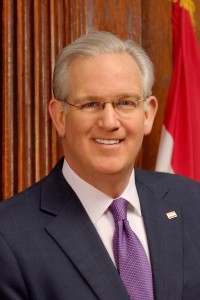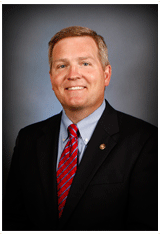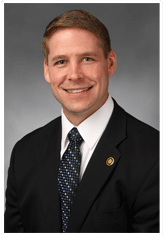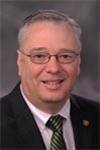
ST. LOUIS — When Gov. Jay Nixon announced that he vetoed the General Assembly’s well-touted tax cut legislation today, supporters of the bill in the legislature immediately started figuring out what their next step will be.
The veto comes a week after bringing to light some concerns his office has about a $200 million prescription sales tax hike within House Bill 253. Legislators said the unintentional tax increase language came directly from Nixon’s Department of Revenue. The Department rebutted by saying the language they provided protected the prescription sales tax.
Finger-pointing aside, the question now is whether the legislature will take action to override Nixon’s veto.
Rep. T.J. Berry, R-Kearney, who sponsored HB253, said he’s confident the votes are there for an override in the House come September’s veto session. He added that the Senate isn’t a concern as “they’ll have the votes.”
The final vote in the House was 103-51, six votes shy of a veto-proof majority, with seven Republicans absent from the vote. Assuming all six — the seventh absentee was elected to Congress Tuesday — voted for the bill, the bill-backers would secure their override at exactly the magic number.

The final vote in the Senate was 24-9, but didn’t fall quite on party lines. Sen. David Pearce, R-Johnson County, voted against it, and Sen. Ryan McKenna, D-Jefferson County voted in-favor.
Pearce also voted against Senate Bill 26, the initial tax cut legislation, earlier during the session.
“It cut too much too fast, and was too regressive,” Pearce told The Missouri Times. “For those reasons, that’s why I voted against it.”
Another reason Pearce attributed was that currently the foundation formula for education is $600 million under-funded, and as the Senate Education Chair he said it was a concern of his to cut $600 or $700 million that could help benefit the current education deficit.
As the Senate needs only 23 votes to override, which would be every other Republican senator but Pearce, they could secure the vote even if McKenna were to renege on his initial decision.
While the sponsor, Berry, said this bill doesn’t normally gain bipartisan support, calling it a “fairly pure Republican ideals” piece of legislation, three Republican representatives voted against HB253: Reps. Dennis Fowler, Elaine Gannon and Kent Hampton.

Hampton, who represents the southern most part of the Bootheel in Dunklin and Pemiscot counties, said he voted against the bill because of concerns about the revenue stream, especially with school funding, in the area he lives in.
“Dollars are as big as a bedspread down here in this part of the world,” Hampton said, emphasizing that he lives in one of the poorest areas in the state. “With the mechanism taking away from the funding, and with the uncertainty of it being restored, I just couldn’t vote for it.”
If faced with an override, Hampton said he’s not sure how he would vote just yet, but added that he still feels comfortable with the way he voted the first time based on what’s best for his constituents.
The Veto
In the opening line of Nixon’s veto letter, he calls the tax cut bill “an ill-conceived, fiscally irresponsible experiment,” going on to say that one of the effects could jeopardize the state’s “basic funding for education and vital public services.”

Sen. Will Kraus, R-Lee’s Summit, the Senate handler for HB253, sent out a response to Nixon’s veto earlier today, saying he’s “disappointed that the governor, who campaigned on fiscal responsibility, would veto the first broad-based tax rate cuts in nearly 100 years.”
Kraus said the veto was the governor standing “on the side of higher taxes” for Missouri,” and made mention to Nixon making the veto announcement while flying in the plane that was purchased months back, “using even more tax payer resources to tell taxpayers he won’t cut their taxes.”
Kraus certainly wasn’t the only Republican legislator to be disappointed by the veto.
Berry, the bill’s sponsor, told The Missouri Times that the governor’s veto was “short-sighted.”
“We’ll come back in September and work to override him,” Berry said. “In January, we’ll come back to fix the supposed problem with prescriptions since that part didn’t go into effect until 2015, which gives us some time to fix it.”
Berry said he doesn’t think it was anyone’s intent to increase the sales tax for prescriptions. He said while that language came from the Senate, when he read it he didn’t think the language did what Nixon’s administration said it would with the tax hike.

“Mistakes do happen, and most mistakes are honest mistakes,” he said.
Also speaking out against Nixon’s action was the Missouri Chamber of Commerce, which sent out a press release Wednesday afternoon expressing concern about a veto of a $384 million tax cut “Missourians would have received” that could, in turn, benefit businesses.
“Every working Missourian would have received a tax cut,” Chamber President Dan Mehan said. “One of the strongest economic development tools that our state could have put to work for our state was taken away today by Gov. Jay Nixon.”
One organization wrote a letter, which the governor published online, that encouraged the veto. The Civic Council of Greater Kansas City letter, penned by Hallmark CEO Donald Hall, said the fiscal note of the bill was “grossly inadequate, and does not reflect the true extent of lost revenues” to Missouri.
Similar to Pearce’s concerns, the Council wrote that they believe the bill could result in a loss in General Revenue funds, which would adversely affect education.
“Unfortunately, Missouri has already drastically cut state services, increasing class sizes, raising college tuition and deferring maintenance on Missouri’s roads and bridges,” Hall wrote. “Further tax cuts will only make matters worse, and do nothing to create jobs or make businesses more competitive.”
Nixon said in a press release sent after his Wednesday speaking event in Kansas City regarding the veto that the $800 million “price tag” could undermine the state’s economic and fiscal health, among other things.
“Writing a bad check and saying you’ll figure out a way to pay for it later might make sense in Washington, DC and some other states, but it’s not how we do things in Missouri,” Nixon said.
Until September, Berry said the legislators involved in the legislation will work to secure votes in preparation for veto session.
Ashley Jost is no longer with The Missouri Times. She worked as the executive editor for several months, and a reporter before that.






